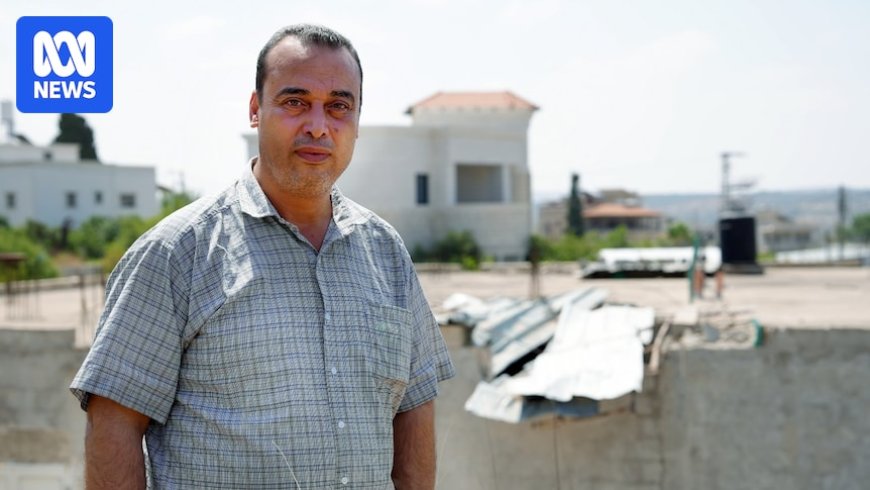Missile Debris Hits West Bank Villages, Endangering Residents
During the conflict between Israel and Iran, missile debris and interceptor shrapnel rained down on Palestinian villages in the West Bank, causing damage and fear among residents. Lack of warning systems and safety measures left Palestinians vulnerable to the falling debris, resulting in injuries and potential health hazards.

While Israel's war on Iran claimed hundreds of Iranian lives and dozens in Israel, Palestinian villages were being showered by missile debris and interceptor shrapnel.
Palestinians in the Israeli-occupied West Bank said they were put at risk by Israeli interceptions over the territory, which sent more than 200 pieces of debris raining down onto villages and cities, damaging homes and businesses and starting fires.
Palestinians do not have bomb shelters or reinforced rooms in their homes and the Palestinian Authority said it does not have the equipment, expertise or budget to set up a missile alert system, as Israel has, leaving West Bank residents without any warning of missile waves.
\"We don't even know where these missiles are coming from. Whether they're incoming or outgoing, we have no idea. You could be walking down the street and suddenly you can die,\" Raed Ahmad Robeh, from the village of Hajje, told the ABC.
Debris from a missile interception can be seen on Raed Ahmad Robeh's home in the village of Hajje. (Supplied)
An 11-metre section of an Iranian missile fell onto Mr Robeh's house during the war, damaging the roof.
\"I got a call saying a missile had struck my house. I was terrified; this is a home built over many years, and seeing it hit like that was devastating,\" he said.
\"Thank God it didn't fall vertically; it landed horizontally on the stairway instead.\"
The large piece was one of several that fell in Mr Robeh's village.
The Palestinian Authority, the internationally-recognised government that has limited self-rule over parts of the West Bank, says eight people, mainly children, were injured in the territory by missile debris, over the course of the 12-day war.
Ziad Abu Arkub's son had a lucky escape when a piece of missile fell on the street near him.
\"He says that he felt a danger near him. He escaped the missile. The bigger part of the missile could have killed him as it fell in the same place where he was,\" Mr Abu Arkub said.
Some of the missile debris also released chemicals, strange liquids and gases that Palestinians fear could be dangerous.
A two-metre-long piece of missile released both gas and liquid when it fell in the small village of Deir as-Sudan, leaving stains from unknown liquids on the ground.
\"It released a substance that could be poisonous, potentially dangerous to people. If any resident had been inside their homes at the time, they could have been injured or even killed,\" village mayor Sufian Suleyman said.
\"The sound of the strikes was scary. You have children here and women, the sound was really scary.\"
The Israeli government said 550 missiles were fired by Iran towards Israel during the war, with most of them intercepted by Israel's sophisticated air defences.
The interceptors were also shooting down debris above Israeli cities, ensuring it did not fall on homes.
But the Palestinian Authority said debris fell on 35 homes and three factories in the West Bank, as well as starting two bush fires.
Israel's military has also closed many West Bank roads to Palestinians since the war in Gaza began and set up extra checkpoints, making it difficult for emergency services to respond.
\"Our biggest problem is that the crossings are always closed; ambulances and firefighters can't reach us. We have no shields, no shelters, and no way to protect ourselves,\" Raed Ahmad Robeh said.
Father Ziad Abu Arkub said Palestinians felt the Israeli military was deliberately putting them in danger.
\"Israel could not care less about our safety. The fact is that their interception missiles are purposely done over our villages provoking damage on our livelihood, our village main squares and schools up to the point of becoming quite dangerous,\" he said.
The Israeli military said it had no comment regarding that allegation or about missile interceptions or debris in the West Bank.
What's Your Reaction?
 Like
0
Like
0
 Dislike
0
Dislike
0
 Love
0
Love
0
 Funny
0
Funny
0
 Angry
0
Angry
0
 Sad
0
Sad
0
 Wow
0
Wow
0






















































































































































